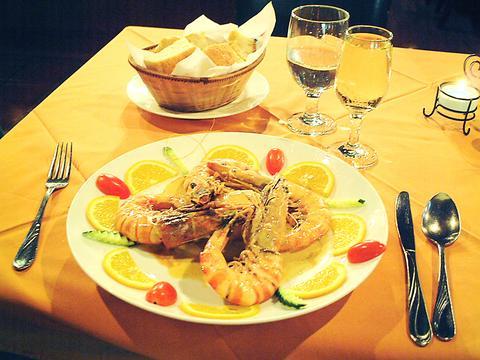The last time we reviewed Papa Giovanni's was in April of 2000 when there were rumors that Papa and family had opened a bakery adjacent the restaurant.
We returned this time on rumors that the bakery has closed and on more troubling reports of disgruntled patrons.
Because the Taipei Times has praised Papa and staff in past reviews, the news of unhappy clientele was ? well, news. Forumosa.com, an Internet site popular with Taiwan's expatriate community, has dozens of postings regarding Papa Giovanni's under its "restaurants, bars and clubs" forum.

PHOTO: DAVID MOMPHARD, TAIPEI TIMES
The postings almost unanimously decry the restaurant's poor service, high prices and Papa's "attitude." One post said he left the restaurant with "the distinct impression that it could only have been due to direst economic necessity that the owner stooped to allow me into his establishment."
But on my visit there Tuesday night I watched members of the Giovanni family walk most every patron to the door to say goodnight. I saw the wait staff attentively filling water glasses and clearing plates. Papa himself took my order and ended every sentence with "sir."
As far as I could determine during this single visit -- which was unannounced -- the rumors of Papa's despise are greatly exaggerated. Of the complaints I've read or been told, I share only one: the prices are too high. My order of a small caesar salad, king prawns in bourbon sauce, a glass of house white wine and tiramisu cost over NT$1,500. The small caesar alone -- which I ordered on Papa's suggestion -- cost NT$320. It had no romaine lettuce, no croutons, very little parmesan and not the slightest hint of anchovy.
The king prawns were indeed kingly and the bourbon sauce was delicious, but at NT$680 for four you'd have to be a king to order them a second time. You can find equally large and fresh prawns in most of Taipei's night markets for half the price -- with the caveat being that they're covered in mayonnaise, not bourbon sauce. No whines regarding the house white wine (NT$180); I should have had a second glass instead of the tiramisu (NT$180).
Talking with Papa on my way out, I asked what became of the bakery. He explained that he closed it because, as everything was baked after hours, he couldn't control the quality. He also hinted that there may not have been a market for his European-styled products. "Chinese people, they like soft breads," he said.
As for the complaints about him and his restaurant, he said he was unaware of the online postings and didn't seem overly concerned. "People sometimes don't like something."

April 14 to April 20 In March 1947, Sising Katadrepan urged the government to drop the “high mountain people” (高山族) designation for Indigenous Taiwanese and refer to them as “Taiwan people” (台灣族). He considered the term derogatory, arguing that it made them sound like animals. The Taiwan Provincial Government agreed to stop using the term, stating that Indigenous Taiwanese suffered all sorts of discrimination and oppression under the Japanese and were forced to live in the mountains as outsiders to society. Now, under the new regime, they would be seen as equals, thus they should be henceforth

Last week, the the National Immigration Agency (NIA) told the legislature that more than 10,000 naturalized Taiwanese citizens from the People’s Republic of China (PRC) risked having their citizenship revoked if they failed to provide proof that they had renounced their Chinese household registration within the next three months. Renunciation is required under the Act Governing Relations Between the People of the Taiwan Area and the Mainland Area (臺灣地區與大陸地區人民關係條例), as amended in 2004, though it was only a legal requirement after 2000. Prior to that, it had been only an administrative requirement since the Nationality Act (國籍法) was established in

With over 100 works on display, this is Louise Bourgeois’ first solo show in Taiwan. Visitors are invited to traverse her world of love and hate, vengeance and acceptance, trauma and reconciliation. Dominating the entrance, the nine-foot-tall Crouching Spider (2003) greets visitors. The creature looms behind the glass facade, symbolic protector and gatekeeper to the intimate journey ahead. Bourgeois, best known for her giant spider sculptures, is one of the most influential artist of the twentieth century. Blending vulnerability and defiance through themes of sexuality, trauma and identity, her work reshaped the landscape of contemporary art with fearless honesty. “People are influenced by

The remains of this Japanese-era trail designed to protect the camphor industry make for a scenic day-hike, a fascinating overnight hike or a challenging multi-day adventure Maolin District (茂林) in Kaohsiung is well known for beautiful roadside scenery, waterfalls, the annual butterfly migration and indigenous culture. A lesser known but worthwhile destination here lies along the very top of the valley: the Liugui Security Path (六龜警備道). This relic of the Japanese era once isolated the Maolin valley from the outside world but now serves to draw tourists in. The path originally ran for about 50km, but not all of this trail is still easily walkable. The nicest section for a simple day hike is the heavily trafficked southern section above Maolin and Wanshan (萬山) villages. Remains of